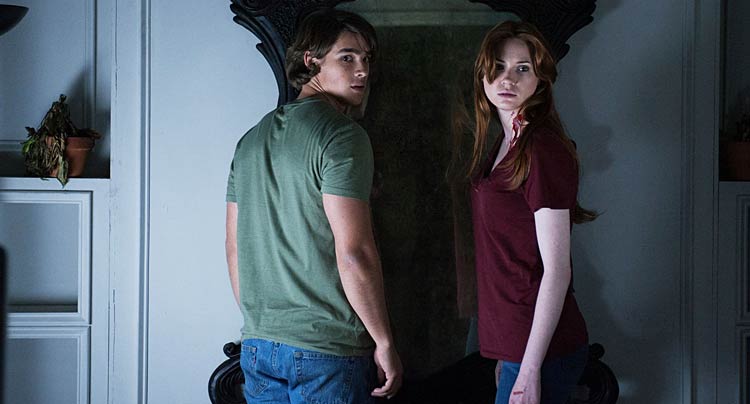
The rare kind of modern horror film that's lingering effect will stay in your mind long after the lights come on.

The rare kind of modern horror film that's lingering effect will stay in your mind long after the lights come on.
Don’t be fooled by Paranormal Activity and Insidious getting mentioned in the marketing for Oculus. While those films (or, more specifically, their franchises) are about big jolts and loud noises, Oculus surprisingly goes for a more subdued and unsettling approach. Mike Flanagan, the director of Absentia, returns with a feature-length adaptation of his short film. In both films, Flanagan separates himself from other American horror filmmakers by his focus on character and story. Absentia and Oculus start out with people confronting personal tragedies and, after fully establishing his characters, Flanagan injects a kind of demonic folklore more inspired by horror literature than films. This strategy isn’t exactly brimming with originality, but the combination of these different influences create a result that’s more refreshing and unnerving than most horror films hitting the multiplex.
Kaylie (Karen Gillan) and Tim (Brenton Thwaites) lost both of their parents 11 years ago. Having both gone insane, their father (Rory Cochrane) shot and killed their mother (Katee Sackhoff) shortly before Tim allegedly killed their father in self-defense. At age 21, Tim is finally released from psychiatric care when his doctor declares him fit to re-enter society. Kaylie, now 23, has spent the years hunting down what she believes is the real killer of their parents: an antique mirror their father bought when they moved into their childhood home. Just as Tim is released, Kaylie finally finds the mirror and convinces him to help prove the mirror’s evil nature before they “kill it” for good.

Oculus’ first half is ambiguous around the mirror itself, which seems pointless. If the mirror wasn’t evil there would be no movie, but the point of this ambiguity isn’t to question the mirror. Flanagan and co-writer Jeff Howard are showing how the truth is relative according to each person. Tim argues Kaylie’s claims about the mirror, referred to as The Lasser Glass, by bringing up everything he learned from his years in therapy. These arguments are used to show flashbacks (the film cross-cuts between present day and 11 years earlier, where we see exactly what happened to Tim & Kaylie) where the story is shown in a different, more rational light. These scenes feel drawn out and useless at first, but Flanagan and Howard’s screenplay is much smarter than it appears.
These moments plant the seed of questioning what’s real, and once a certain truth is established, Flanagan finally lets things fly off the handle. Much like the titular hotel room in 1408, the mirror’s power comes from distorting what people see. As the mirror’s strength grows, all trust is lost, and the idea of losing one’s grip on reality provides the film’s biggest chills. At the same time, Flanagan and Howard find an ingenious way to merge the flashbacks into present day, creating a kind of controlled chaos anchored by Flanagan’s excellent editing.
The final act’s disorientation effect is exciting to watch unfold, even if it comes at the cost of ending things on a rather anticlimactic note. Oculus is one of the rare psychological horrors that perfectly fits the description. It’s the rare kind of modern horror film that’s more about lingering in the mind long after the lights come on than providing quick, forgettable jolts. Horror fans shouldn’t miss Oculus; films as creepy as this one don’t come along too often.